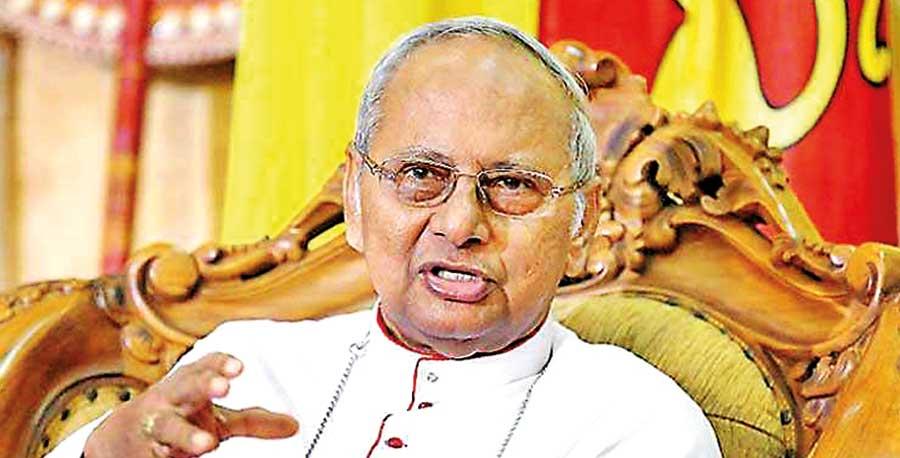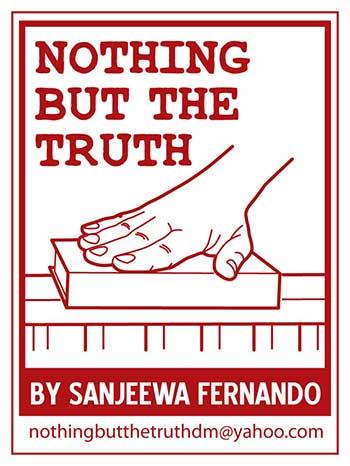24 Jun 2020 - {{hitsCtrl.values.hits}}

Malcolm Cardinal Ranjith
The comment made by maverick politician Harin Fernando, during an election rally, that His Eminence Malcolm Cardinal Ranjith had played a role in the Presidential Elections held last November and that his conduct was despicable, had come under a lot of flak. The Archdiocese of Colombo issued a statement renouncing the former Minister’s statement. Many Christians and Catholics have expressed anger over the manner in which this politician attacked the higher most official of the Catholic Church in Sri Lanka. Many from the right wing Sinhala Buddhist political spectrum, too, are seemingly shocked by the comments made relating to the Cardinal.
The particular comment made by Fernando is attributed a 5% vote loss for Sajith Premadasa; which he claims to be those of the Catholics and which, had it been cast in favour, could have made the results interesting, to say the least. Of course there is no way of objectively deciding whether the 5% story is based on reality or a mere punch in the air. But one thing is certain; the overwhelming support the Sinhala Catholics offered Maithripala Sirisena in his bid for Presidency in 2015 against Mahinda Rajapaksa was not forthcoming for Premadasa and the catalyst for the dwindling of that vote base, which is traditionally pro UNP, started with the Easter Sunday attacks. Some statements made by the Cardinal did give the impression that in addition to the fact that the rulers at that time were utterly negligent and in dereliction of their duties, they were not inquiring into the incidents and the lead up, with the vigour and impartiality that were warranted by the magnitude of the situation. 
Heads of the Catholic Church in Sri Lanka have always maintained a neutral attitude in matters related to politics. But they have not shunned taking action when the necessity arises. The opinion of the Archbishop of the Catholic Church, therefore, does carry great weight when expressed on absolutely necessary occasions. Unfortunately His Eminence the Cardinal, the present Archbishop, has forayed into the sensitive political melee time and again; thus arousing suspicion whether he was aligned with a certain political party. Yet one thing that remains to his credit is that he took the leadership in averting a communal blood bath after the immediate aftermath of the April 2019 carnage. The leadership that he gave in treading those treacherous times was not only to Catholics, but to the entire country. It is no exaggeration that at that particular time he was the most popular personality even among the Buddhists and Muslims to the extent that there were requests from him to contest the Presidential election in November 2019. He declined.
For some time now, the Cardinal has been making controversial and mainly uncalled for statements in public. When there were allegations on a spate of attacks on Christian and Catholic places of worship during the Mahinda Rajapaksa regime, the Cardinal was blissfully unaware of any such attacks. He said that those were fundamentalist churches that came under attack and not mainline. Yet civil rights activists have listed dozens, if not hundreds of incidents where churches, prayer gatherings, priests, houses of the faithful came under threat and attack. Yet the Cardinal was enjoying the ‘tolerant Buddhist environment’ he kept referring to in his statements, while the faithful struggled to uphold their religious rights, an uphill battle without the support of their Shephard.
Then came his statement on human rights. The event was the annual feast of the St. Matthews Church, Ekala. We were personally witnesses to his homily, which had no mention to the holy and evangelic mission of Matthew the Gospel writer, who recorded the life of Jesus Christ, which arguably is the most read gospel of all. But he turned a ‘homily of piety’ to a ‘harangue of politics’ by accusing those who upheld human rights; that human rights were a western religion and for us, Sri Lankans there was no need for such a secular religion as human rights. We know how Mangala Samaraweera, the then Minister of Finance responded and the backlash.
Yet what had not crossed the Cardinals mind was that our country has undergone two brutal insurgencies in the south where 100,000 lives were lost; most of them extra judicially, abducted, under torture, burnt on tires by the way side. The Northern conflict too has seen gross violations of human rights from all sides. Yet as to what purpose the ‘religious environment’ served in either averting or remedying such catastrophes, the Cardinal omitted to mention.
Then there was the speech at the re-consecration of the St. Sebastian’s Church at Katuwapitiya which was devastated by the bombing on Easter Sunday. Instead of emphasising on the spiritual reawakening and the repentance that should have been the message from that much publicised pulpit , the cardinal did go as far as asking the government to resign and let ‘those who could rule’ take their place. In the political context, those who could rule pointed only in one direction. According to his sermon the fundamentalist terrorists who murdered hundreds were ‘ misguided youth’ being used by external forces and the President and the Prime Minister fell little short of actually carrying out the murders.
The ‘Cardinal’s outbursts’ on many occasions bordering on the political are numerous; one only need to google ‘ Cardinal Ranjith in politics’ to come across a spate of articles dealing with his heroics in the realm of the politics. The Catholic Church has produced leaders such a Desmond Tutu of South Africa and Oscar Romero of El-Salvador who took political stances; but for the marginalised, the poor, the discriminated and the underprivileged, but not to toe the line of any political alliance. It is very difficult to put Cardinal Ranjith on that exalted pedestal.
Countries that have had backward feudal social structures struggle to come out of those hierarchy oriented thinking patterns even in modern times. Priesthood too affords prestige and position that render them immune to any kind of criticism in such societies. Yet as many of the Sangha community had learned to the detriment of Buddhism in this country, once you cross the political Rubicon, you renounce the prestige the robe gives you of being immune thus. The leaders of the Sangha have invited the fate that they are in today through direct involvement with politics and many are accomplices to that.
Other religions, specially, the Christian faith, have so far kept aloof of national politics and kept their reputation and regard in society intact. Yet there is only one personage who always comes dangerously close to crossing that line, not through direct political activity, but through actions and statements that fall in to that grey area where subjective interpretation could render them politically biased expression of opinion.
Whether the 5% allegation is a fact or a figment of the Harin Fernando imagination, we do not venture to comment. Yet, as a Catholic this columnist cannot be alarmed; not only at the harangues that have been coming the Cardinal’s way of late, but more so, about the grey areas that His Eminence has chosen to traverse in the realm of politics when he express opinions.
Once you cross the Rubicon of politics, you can hardly expect the robe to give you immunity from criticism.
26 Dec 2024 23 minute ago
26 Dec 2024 2 hours ago
26 Dec 2024 3 hours ago
26 Dec 2024 5 hours ago
26 Dec 2024 6 hours ago